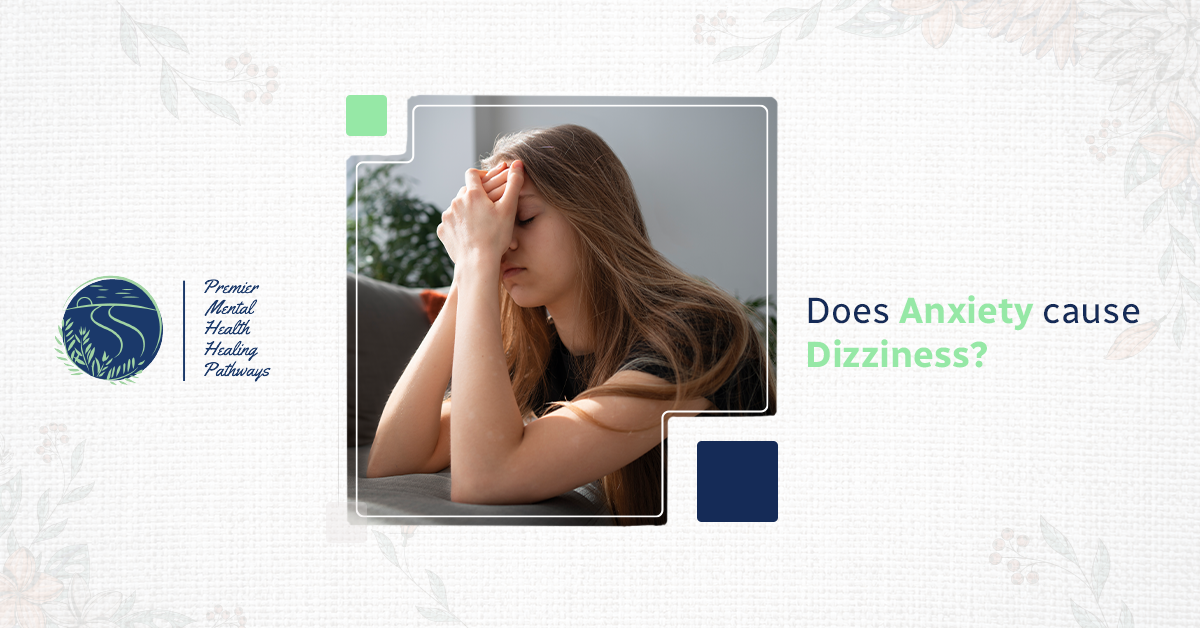Anxiety, a common ailment, impacts countless people globally. It brings about a variety of physical and emotional signs, making everyday life tough.
One symptom frequently mentioned by those with anxiety is dizziness. But does anxiety cause dizziness?
Let’s delve into the connection between anxiety and dizziness, its reasons, and how to handle it.
What is Anxiety?
It’s a natural reaction to stress, fear, or worry. It’s how our bodies prepare for an apparent threat, often referred to as the “fight or flight” response.
Anxiety can be beneficial in certain scenarios, like helping us stay vigilant.
However, if it occurs too often or intensely, it can be overwhelming.
Persistent anxiety can lead to disorders like generalized anxiety disorder (GAD), panic disorder, or social anxiety.
Such disorders can result in physical symptoms that may be worrying, such as dizziness.
Does Anxiety Cause Dizziness?
Yes, it can.
Anxiety produces physical reactions in your body that might affect balance.
Anxiety kicks in, and your body changes. Your heart races, you breathe rapidly, muscles contract.
These shifts can throw off your bloodstream’s oxygen-carbon dioxide balance, making you feel dizzy or lightheaded.
The Link Between Anxiety and Dizziness
Dizzy from Anxiety: How It Happens
Anxiety can often cause feelings of dizziness or light-headedness. This sensation varies; it could be minor or overpowering, making you think the room is spinning.
Let’s look at why you might feel dizzy from anxiety:
- Hyperventilation: Quick, shallow breaths often happen during an anxiety attack. This rapid breathing lowers carbon dioxide in the blood, causing dizziness.
- Increased Heart Rate: When anxious, your heart races, which can make you feel lightheaded. Stress can limit blood flow to specific parts, including the brain. This limited flow can result in dizziness.
- Muscle Tension: Anxiety often leads to physical tension, especially in the neck and shoulders. This strain may disrupt blood flow, leading to dizziness.
- Adrenaline Release: Anxiety can set off adrenaline, leading to multiple physical effects, including dizziness. This hormone gets the body ready to either fight or flee, but it can also trigger feelings of imbalance.
Anxiety can induce dizziness, but dizziness could arise from other medical issues too.
Always consult a healthcare provider if you’re experiencing persistent dizziness to eliminate other potential causes.
Symptoms of Dizziness from Anxiety
Dizziness from anxiety can show up in various ways.
Some might feel like everything is spinning around them, known as vertigo. Others might feel like they’re about to pass out.
Frequently seen dizziness symptoms due to anxiety are:
- A feeling of spinning or tilting.
- Lightheadedness or faintness.
- Nausea or upset stomach.
- A sense of being off balance.
- Trouble focusing or feeling “foggy”.
Anxiety and Feeling Off Balance
One of the common complaints among those with anxiety is anxiety and feeling off balance.
This sensation can be unsettling, particularly in public or while doing day-to-day activities.
Anxiety can impact your vestibular system, the part of your inner ear in charge of balance.
This can result in a feeling of instability or detachment from your surroundings.
The imbalance often feels like a continuous state of instability or like you’re walking on a soft surface.
Rapid breathing or overexertion during a panic attack can also trigger this symptom.
Can Anxiety Cause You to Pass Out?
Anxiety alone hardly ever causes people to faint. But if a panic attack is severe, it can lead to passing out.
Why? Sometimes, extreme stress makes the body reacts with a vasovagal response, dropping the blood pressure suddenly.
But remember, fainting usually means other things. Maybe you’re dehydrated or tired, or your blood sugar is low.
Anxiety isn’t usually the only factor. If anxiety strikes and you think you’ll faint, slow your breathing. Get somewhere safe. Sit or lie down.
How to Manage Dizziness From Anxiety
If you’re experiencing dizziness due to anxiety, here are some ways to help reduce or stop the feeling.
- Breathing Exercises: Breathing deeply, and slowly can manage your heartbeats and oxygen, lowering dizziness. Breathe in, hold, and breathe out, each for four counts.
- Mindfulness and Meditation: Practicing mindfulness can lower anxiety, which can decrease dizziness.
- Hydration: Lack of water can increase dizziness. Drink a lot of water, especially when you’re feeling anxious.
- Grounding Techniques: When you start to feel dizzy, concentrate on the things around you. It’s a grounding technique.—touch something solid, focus on a particular object, or listen to calming sounds.
- Physical Activity: Light exercises can increase blood circulation and relieve dizziness. Regular exercises can deal with stress over a period.
When to Seek Professional Help
Are you experiencing chronic dizziness anxiety? If so, don’t ignore it. Especially if you’re getting severe symptoms like fainting caused by anxiety.
At this point, professional help becomes indispensable.
Mental health experts can help uncover the reason behind your anxiety and lay out a helpful treatment plan. This plan might involve therapy, medication, or different treatment forms.
Summary
In summary, does anxiety cause dizziness? Yes. Anxiety can provoke dizziness through many physical forms which could be hyperventilation, a quickened heartbeat, or muscle rigidity.
Remember, if anxiety-induced dizziness is affecting you, you’re not isolated, and it’s treatable.
Successful strategy implies using grounding methods, supervising your anxiety, and approaching professional aid when required.
This approach can minimize dizziness, enhancing your life quality.
If anxiety is meddling regularly in your life and inducing physical symptoms like dizziness, maybe it’s time to ask for help.
We, at Premier Mental Health Healing Pathways, are committed to assisting you in tackling your anxiety and reinstating your mental wellness.
Get in touch with us now to understand better our services and how we can support you on your path towards improved mental health.
FAQs
Is dizziness a sign of anxiety?
Yes, dizziness is a well-known side effect of anxiety. This often occurs during high-stress situations, panic episodes, or long stretches of anxiety.
However, it’s crucial to understand the difference between dizziness from anxiety and dizziness due to other health problems.
If you’re not sure if your dizziness comes from anxiety, always check with a medical expert.
How do I stop being dizzy from anxiety?
Mustering the dizziness induced by anxiety could involve deep breath controls, grounding methods to help you stay present, and light workouts.
Keeping hydrated and stress management via relaxation strategies can also ease dizziness related to anxiety.
How long does anxiety dizziness last?
The length of anxious dizziness varies among individuals and the severity of their anxiety. It could last from several minutes to an hour.
Yet, if dizziness persists, seek professional help.
Can stress and anxiety make you feel lightheaded?Yes, both stress and anxiety can lead to feeling lightheaded.
The body reacts physically to anxiety with fast breathing, increased heart rhythm, and muscle stress.
These reactions can upset balance and cause lightheadedness or dizziness.
What are 5 signs you have anxiety?
Common signs of anxiety include:
- Worrying excessively or fearfulness.
- Feeling restless or on edge.
- Fast heartbeat or tremors.
- Finding it hard to focus or feeling “clouded.”
- Physical manifestations like nausea, dizziness, or muscle stiffness.






No comment